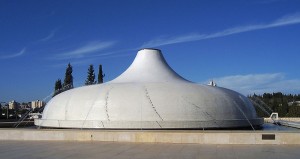How to Study a Dead Sea Scrolls Text: Consensus and Dissidents

Shrine of the Book, Israel Museum, http://commons.wikimedia.org/wiki/File:Israel_-_Jerusalem_-_Shrine_of_the_Book.jpg
I want to introduce a related problem that we have had in understanding our own field. This has to do with the discussion of the “consensus” vs. what are often called dissident theories. This terminology masks some very important issues in the epistemology of scholarship and I think that we do ourselves a disservice with this kind of description. To many, this term implies a political rather than an academic Weltanschaung.
Humanities scholarship is not hard science. We need to remember that even in hard science there is human evaluation of the results of observation or experimentation. Once the facts are correctly established, scientists will debate the meaning of those facts. The inability to show that the facts are real facts usually results in complete disqualification of the research. In Humanities we also deal with facts and with the evaluation of those facts. Actually, however, there are three categories: Actual, provable facts, similar to those in hard science, then what I would term “soft facts,” which means that scholars have different opinions about the nature of the data itself. Such an intermediate category is characteristic of all Humanities work. Finally, there Is the category of evaluation, common even with the hard sciences.
When applied to our field this works as follows: First, there is a set of facts that result from our observation of the archaeological and textual material, and the historical context. This set of facts, like the dating of the overall corpus or the pluriformity of biblical texts, is theoretically capable of disproof and hence can be considered factual. Second, we can debate properly whether a given fragment is Deuteronomy or expanded Torah. This is the category of soft facts. There are facts but we legitimately disagree about what they are. The third category, our individual or shared evaluations, to be legitimate, have to be based on the hard facts, on particular arguments regarding the soft facts, and have to be able to be shown to flow from hard fact to soft to evaluation. If that is not the case with the work of a scholar in general or with one particular contribution, it is not scientific and not acceptable. In order for an alternative theory to be exactly that that it has to be analyzable in this way and proceed according to this standard academic logic. If it does not, it is quackery.
From this point of view we can reevaluate the idea of a consensus. Statements that make assertions about such things as the Essene identification to the effect that they constitute a consensus, whether right or wrong, create the impression of a cabal controlling ideas and so these kinds of statements misrepresent the manner in which we do our scholarly work. Rather, the unspoken consensus is about the modus operandi that I have set forth that flows from the normal approaches of Humanities scholarship. It is a consensus to accept the reality of certain scientifically provable facts and to work from them. This is what separates mainstream Scrolls scholarship from so called dissident views.

Leave a Reply